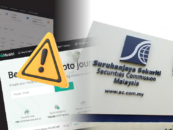Malaysia Still Behind International Counterparts On Blockchain Patents
by Fintech News Malaysia September 6, 2019As blockchain and distributed ledger technology (DLT) move from their open source and peer-to-peer beginnings and enter the mainstream, companies are rushing to file patent applications.
In this area, China-based companies largely dominate their international counterparts and have so far filed the most patents related to blockchain. According to IPR Daily, a Chinese intellectual property news site, China represented 67% of the world’s global blockchain patent applications in the first half of 2019.
Chinese e-commerce giant Alibaba is the company that filed the most blockchain patents, topping the list with 322 blockchain patents, followed by PingAn with 274 patents, and Nchain with 241 patents.
China is followed by the US accounting for 16% of all of the world’s blockchain patents filed, Japan accounting for 5%, Germany accounting for 4% and South Korea accounting for 2%.
Though Malaysia is still far behind when it comes to blockchain patents, efforts have been made to develop intellectual properties (IPs), according to a recent report by the Malaysian Industry-Government Group for High Technology (MIGHT).
In a research titled Malaysia: Blockchain and Distributed Ledger Technology (DLT), the technology think tank cited MyDNATM by VTOS Malaysia, an internationally patented insurance telematics solution that combines service oriented architecture (SOE) and blockchain.
Since 2016, VTOS Malaysia have deployed blockchain alongside telematics for Malaysia Motor Insurance Pool (MMIP), an entity under the purview of Bank Negara Malaysia, to monitor engine data for insurance purposes.
Moving forward, MIGHT says IP development will likely be one of the most important factors for Malaysia.
“As more than 98% of [Malaysia’s] businesses are small and medium-sized enterprises (SMEs), the open-source system could allow a lower cost for technology adoption than the traditional proprietary IP system. This would place SMEs in a better position to seek new opportunities,” the report says.
The research, which addresses the current state of blockchain and DLT development in Malaysia, says that although crypto and blockchain awareness is still limited compared to other locations like China, the US or Singapore, several initiatives have been launched since 2015 to address this issue and raise adoption.
The report notes the number of blockchain events which leapfrogged in 2017, jumping from 3 in 2016, to 49 in 2017 and 89 in 2018. These events have emerged as important platforms to share and improve technical knowledge, promote ideas and experiences, and enable networking, the report says.
Government pushes blockchain adoption
But perhaps one of the most active actor that’s helped promote blockchain and boost adoption is the Malaysian government itself, and today, several governmental agencies, including the Securities Commission (SC) of Malaysia, Malaysia’s national applied research and development center, MIMOS, the Ministry of International Trade and Industry (MITI), as well as Kementerian Pendidikan Malaysia, a government agency focused on the education sector, are either exploring or experimenting with blockchain, the report says.

Image: The current government efforts in blockchain regulatory framework, Malaysia: Blockchain and Distributed Ledger Technology Report 2019, MIGHT
During its annual Synergistic Collaboration by SC (SCxSC) event in November 2018, the SC unveiled a report, titled Capital Market Architecture Blueprint in a Decentralised World, in which it outlined the recently completed Project Castor, an initiative ran in collaboration with a local blockchain solution provider Neuroware.io. The idea behind Project Castor was to develop a “multi-tiered market environment” that contained both centralized and decentralized markets, with the latter underpinned by DLT.
Meanwhile, Bank Negara Malaysia (BNM), the country’s central bank, has been working towards facilitating the adoption of cutting edge technologies including DLT though initiatives such as its regulatory sandbox, launched in 2016, as well as the Financial Technology Enabler Group (FTEG), a platform to explore critical enablers in supporting infrastructure and framework development for the financial industry.
But efforts involving blockchain increased substantially in 2019, notably through public/private sector initiatives backed by blockchain communities including those responsible for the development of Bitcoin Core, Ethereum, NEM and NEO, according to the government’s website.
Some noteworthy blockchain initiatives, according to the MIGHT report, include applications of the technology for renewable energy certification (Tenaga Nasional), mobility (VTOS), asset tagging (Luxtag.io), Shariah-compliant gold trading (HelloGold), and over-the-counter (OTC) markets (Neuroware.io).
New crypto regulations
Earlier this year, a new rule came into effect that made the SC the competent government agency to oversee digital asset offerings and crypto exchanges. The new regulation also required these companies to seek approval from the SC before starting operations.
As of June 2019, the SC had conditionally approved only three companies to establish and operate digital asset exchanges in the country: Luno Malaysia Sdn Bhd, Sinegy Technologies (M) Sdn Bhd, and Tokenize Technology (M) Sdn Bhd. These were given nine months to comply with registration requirements.
Malaysia’s efforts to regulate the crypto space is part of regulators’ desire to protect investors by enabling them to identify more easily the serious players as crypto scams and pyramid schemes proliferate, the report says.







